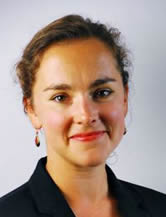
Abigail Andrews, Ph.D.

- Project Description
- Community Partners
- Profile
Project Description
“My project for the fellowship will be to redesign the Mexican Migration Field Research Program (MMFRP) to be more sustainable, include more concrete learning outcomes, and produce more immediate publicly-accessible results for our border region as well as policy makers and migrant advocates more broadly.
Established in 2004 by UCSD political science professor emeritus Wayne Cornelius, the MMFRP is a year-long academic program in which students receive training in methods and migration literature (fall), conduct on-the-ground field research with migrants in the San Diego-Tijuana region (winter) and then analyze and write up their results (spring). Participants gather policy-relevant data on issues related to migration between the U.S. and Mexico, author papers based on the field data they gather, and present their findings to policy-makers in Sacramento and Mexico City. The program has been recognized by outlets like the Chronicle of Higher Education as one of the nation’s most innovative efforts to create undergraduate research opportunities at a major university. For many years, the program took students to rural migrant-sending communities in Mexico to conduct surveys about migration, from which it produced a self-published book each year.
I took over the program in 2018 and have significantly adapted it to current policy issues of deportation and the Central American asylum “crisis”, shifting the focus to our own border region, which has garnered intense public scrutiny for the humanitarian and political crises occurring here around migration. I would like to make community engagement and service a more direct element of the program. I began this process this past year by having students volunteer in migrant shelters even as they were conducting research and by encouraging their own initiatives to establish student organizations and support the migrants involved.
While the MMFRP is already a transformative program, I would like to rework it to better serve both students and the public organizations with which the program is involved. For one, while the program helps contribute to inspiring future change-makers, I would like to more concretely measure its outcomes and as well as create assignments that more directly train students to create public-facing work (rather than academic papers written exclusively for the purpose of course assignments or self-published academic books). I would also like to establish deeper forms of engagement with the organizations that support the program, where students currently volunteer but where I imagine they might also begin contributing to substantive change. Finally, I would like to find ways to integrate policy outcomes more directly into the work, as students present their work to state and federal policy makers in California and Mexico. And, I would like to begin doing this in conjunction with my own ongoing research – as well as other faculty, graduate, and possibly undergraduate research - in the area.“